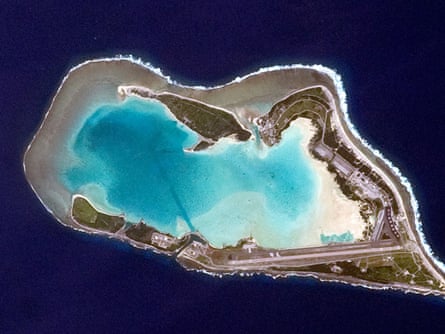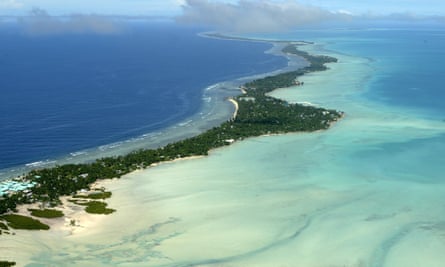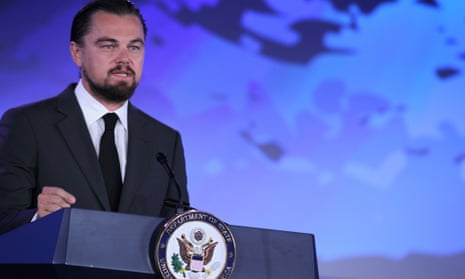Barack Obama used his executive powers as president on Tuesday to create the world's largest marine sanctuary, banning commercial fishing, mining and oil exploration in a vast expanse of the Pacific.
The move – which saw Obama once again bypass an unwilling Congress to advance his environmental agenda – could potentially put nearly 800,000 sq miles in the south-central Pacific off-limits to commercial exploitation.
In a related measure, the White House announced a new task force to crack down on illegal fishing operations and black market seafood making its way to US supermarkets.
"We can protect our oceans for future generations," Obama said in a brief video address to an international ocean summit at the US State Department.
Seeking to deflect an anticipated Republican backlash against his use of his executive authority, Obama said he was following the lead of earlier presidents by expanding an existing protection zone.
“Like Presidents Clinton and Bush before me I am going to use my authority as president to protect some of our most precious marine landscapes, just like we do for mountains and rivers and forests,” Obama told the summit.
The marine sanctuary under consideration would vastly expand the areas protected around the Pacific Remote Islands Marine National Monument, which was originally established by George Bush.
The area, around seven uninhabited islands and atolls under US control, contains some of the most pristine marine environments in the world, the White House said in a statement.
The statement said Obama would decide on the final geographic scope of the protection zone after consulting scientists, conservation experts, and fishing interests.

But the Washington Post which had an early look at the announcement, said the sanctuary could extend up to 780,000 square miles, doubling the area of ocean under protection.
Obama was also convening a task force to fight unreported and illegal fishing, the White House said.
Officials said rogue trawlers undermine government's efforts to manage fish stocks. Scientists estimate about one of every five fish is caught illegally, robbing up to $23bn a year from legitimate commercial fishing operations around the world.
The task force would work on coming up with a comprehensive strategy to end pirate fishing by the end of 2014, the White House advisor, John Podesta, said.
In addition to the economic and environmental costs, he said rogue fishing operations were a security threat – “vectors for criminals who traffic in guns, drugs and other human beings”.
The task force will look at requiring fishing vessels to install transponders to track their movements at sea and the source of seafood that ends up in US supermarkets. “Customers will know exactly who caught it, where and when,” the secretary of state, John Kerry, told the summit.
The twin announcements from the White House were intended to spur action from government officials, business leaders and environmental groups attending the ocean summit. “For this effort to succeed, it has to be bigger than any one country,” Obama said.
Moments after his video address, the actor Leonardo DiCaprio told the summit he would donate an additional $7m over the next two years to “meaningful” ocean protection. The actor had earlier given about $2m to the Oceana conservation group.
On Monday, Kiribati's president, Anote Tong, said the Pacific island nation would close off an ocean area the size of California to commercial exploitation by the end of this year. Tong said the ban on commercial fishing in the 157,630-sq-mile area protected area would help speed the recovery of tuna and other fish stocks.
The marine protection area Obama was proposing was originally envisaged by Bush. In his last two weeks in the White House, Bush used his executive powers as president to set up marine sanctuaries in three areas in the Pacific.

Obama was now considering expanding one of those areas, near Wake Island and six other uninhabited atolls.
The Pew Charitable Trusts estimated the move could potentially expand the area Bush protected by a factor of nine to some 780,000 sq miles.
Expanding other sanctuaries designated by Bush, such as the Northern Mariana Islands, would increase the area to 1.5m sq miles, according to Pew.
But the move was in some ways symbolic. Because the islands are uninhabited, there is very little fishing in the area Obama proposes to protect, and no indication mining or drilling is imminent.
However, scientists say bigger marine sanctuaries are easier to enforce and allow more species to recover.
More than 350 scientists this week signed on to a letter to the White House urging Obama to expand marine sanctuaries to up to 20% of each ocean region under US control.
Conservation groups praised Obama's move, as well as his proposals for tracking seafood.
Scientists believe as much as a third of the wild-caught seafood sold in US is landed by illegal fishing trawlers, undermining efforts to sustainably manage stocks
The Oceana conservation group said the task force was “a historic step forward” to stop illegal fishing and seafood fraud.
“Tracking where, when and how our seafood is caught, and ensuring that this basic information follows the product through each step in the supply chain, will help to eliminate seafood fraud and the illegal fishing it can disguise,” the group said in a statement.
Other environmental groups praised the action on illegal fishing, but urged Congress to implement a treaty that would put identification numbers on all fishing vessels and curb landings of illegal fish catches.
“As one of the top seafood importers in the world, the US has a responsibility to ensure that every fish bought in our stores, markets, and restaurants is fully traceable to where it was legally caught,” the World Wildlife Fund said.

Comments (…)
Sign in or create your Guardian account to join the discussion